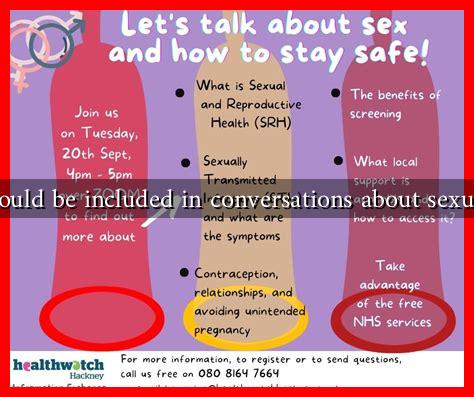-
Table of Contents
What Should Be Included in Conversations About Sexual Health
Sexual health is a vital aspect of overall well-being, yet it remains a topic often shrouded in stigma and misinformation. Engaging in open and informative conversations about sexual health can empower individuals to make informed decisions, promote healthy relationships, and reduce the prevalence of sexually transmitted infections (STIs) and unintended pregnancies. This article explores the essential components that should be included in discussions about sexual health.
The Importance of Comprehensive Sexual Education
Comprehensive sexual education is foundational to understanding sexual health. It goes beyond the mechanics of reproduction to encompass a wide range of topics, including consent, relationships, and sexual orientation. According to the Guttmacher Institute, comprehensive sexual education can lead to healthier sexual behaviors and reduced rates of STIs and unintended pregnancies.
- Consent: Understanding the importance of consent is crucial. Conversations should emphasize that consent must be clear, coherent, willing, and ongoing.
- Healthy Relationships: Discussing what constitutes a healthy relationship, including communication, respect, and boundaries, is essential.
- Diversity in Sexual Orientation: Conversations should be inclusive of all sexual orientations and gender identities, promoting acceptance and understanding.
Understanding STIs and Prevention
Sexually transmitted infections are a significant public health concern. According to the World Health Organization (WHO), more than 1 million STIs are acquired every day worldwide. Conversations about sexual health should include:
- Types of STIs: Educating individuals about common STIs, such as chlamydia, gonorrhea, and HIV, is crucial for awareness and prevention.
- Symptoms and Testing: Discussing the symptoms of STIs and the importance of regular testing can help in early detection and treatment.
- Prevention Methods: Conversations should cover various prevention methods, including condom use, vaccination (e.g., HPV vaccine), and regular health check-ups.
Access to Healthcare Services
Access to healthcare services is a critical component of sexual health. Many individuals face barriers to accessing sexual health services, including financial constraints, lack of transportation, and stigma. Discussions should include:
- Local Resources: Providing information about local clinics, hotlines, and online resources can help individuals access necessary services.
- Insurance Coverage: Educating individuals about what sexual health services are covered by insurance can alleviate financial concerns.
- Telehealth Options: Highlighting the availability of telehealth services can provide a more accessible option for those hesitant to visit clinics in person.
Emotional and Mental Health Considerations
Sexual health is not solely a physical issue; it is also deeply intertwined with emotional and mental health. Conversations should address:
- Impact of Sexual Experiences: Discussing how sexual experiences can affect mental health, including issues like anxiety and depression, is essential.
- Support Systems: Encouraging individuals to seek support from friends, family, or mental health professionals can foster a healthier mindset.
- Body Positivity: Promoting body positivity and self-acceptance can enhance individuals’ confidence in their sexual health.
Conclusion: The Path to Empowerment
Conversations about sexual health are crucial for fostering informed, healthy individuals and communities. By including comprehensive sexual education, understanding STIs, ensuring access to healthcare services, and addressing emotional and mental health considerations, we can create a more informed society. Empowering individuals with knowledge and resources not only promotes personal well-being but also contributes to public health. As we continue to break down the barriers surrounding sexual health discussions, we pave the way for healthier relationships and communities.
For more information on sexual health resources, visit Planned Parenthood.

